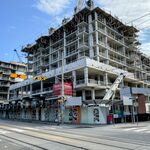pman
Senior Member
It's amazing, though maybe not surprising, that some people want to take Toronto back to the failed, auto-centric 1950's vision of what a city should be. Palma's right - Spadina would have been a disaster, ditto Crosstown.
That's actually be sorta happening on King soon. Transit corridor.It would certainly be nice to see Queen get pedestrianized from Yonge to Spadina in a similar way.
That's actually be sorta happening on King soon. Transit corridor.
I disagree, with provisos. The author of the Economist article is Madelaine Drohan, and though we never met personally, I knew her through very close friends in Editorial at the Globe and Mail, where Madelaine used to have her regular column and later contribute as a guest writer.A really good article on why the Economist is wrong about Toronto's transit:
http://torontoist.com/2017/01/economist-magazine-really-doesnt-understand-toronto-transit/
As for the rest of the article, the challenge for the reader is to figure out how much that it gets so woefully wrong is a result of trying to squeeze a series of historical arcs covering decades of complex decisions and events into one sentence each, how much is the result of bad research, and how much might be the result of someone’s partisan agenda masquerading as journalism.
http://www.madelainedrohan.com/ And her list of accomplishments is much greater than that. Btw, both she and Chrystia Freelander were with the Globe during that golden era. My contacts were mostly in Op Ed.Madelaine Drohan is the Canada correspondent for The Economist. For the last 40 years, she has covered business and politics in Canada, Europe, Africa and Asia. In 2016, she became a senior fellow at the Graduate School of Public and International Affairs at the University of Ottawa. In 2015-2016 she was the Prime Ministers of Canada fellow at the Public Policy Forum.
She is the author of The 9 Habits of Highly Successful Resource Economies: Lessons for Canada, a research report that she wrote in 2012 for the Canadian International Council.
Her book, Making a Killing: How and why corporations use armed force to do business, was published in 2003 by Random House of Canada and in 2004 by The Lyons Press in the United States. It won the Ottawa Book Award and was short-listed for the National Business Book of the Year Award in 2004.
When possible, she conducts journalism workshops for media in Africa and Southeast Asia, with a special focus on business and investigative journalism.
She was awarded a Reuters Fellowship at Oxford University in 1998, and the Hyman Solomon Award for Excellence in Public Policy Journalism in 2001. She was a 2004-2005 Media Fellow at the Chumir Foundation for Ethics in Leadership and the 2004-2005 Journalist in Residence at Carleton University.
She has sat as a volunteer director on the boards of the North-South Institute, Transparency International Canada and Partnership Africa Canada, where she was also president. She lives in Ottawa.
https://en.wikipedia.org/wiki/John_Parker_(Canadian_politician)Municipal politics
In 2006, Parker was elected as the City Councillor for Toronto's Ward 26. In a field of 15 candidates, Parker prevailed by a margin of 215 votes over runner-up Mohamed Dhanani. Parker received a total of 3,369 votes which amounted to just 20% of the popular vote.[3] Parker has received low grades on environmental issues. In 2008, the Toronto Environmental Alliance issued Parker an "F" grade for what they perceived to be an egregious voting record in 2007-2008.[4] While he is widely considered to be a right-wing councillor, Parker has received poor performance grades from the editorial boards of traditionally conservative newspapers in Ontario. The National Post and Toronto Sun gave Parker "C" grades in "report cards" these outlets issued for Toronto City Councillors in 2007 and 2010 respectively.[5][6] November 21, 2011, the Toronto Sun scored Councillor Parker an "A+".[7] In November 18, 2012, Toronto Taxpayer Coalition report card gave a rating of "B"[8]
In 2010, Parker was re-elected in Ward 26. He tallied the most votes in a three way race between previous contender Dhanani and newcomer Jon Burnside. The Toronto Sun supported Parker giving him the recommendation as "a hard-wired East Yorker, who brings a conservative ethic and is not easily panicked."[9] He was selected to be Deputy Speaker in December 2010.[10]
On October 27, 2014 Parker was defeated by Jon Burnside during the 2014 municipal elections and was the only incumbent defeated in the 2014 elections.
I'll detail what I take to issue with the author when I can stomach to get through his hatchet job.
His plan, dubbed SmartTrack, calls for building a new light-rail line (modelled on London’s Crossrail) and adding six stations to existing commuter rail lines.
Finally, there is the role of the federal government, whose offers of money tempt cities to embark on silly projects. Critics point to federal backing for a proposed 6km subway extension that will cost C$3.2bn and have just one station.
ST is "light rail" modeled on Crossrail? Really? It is painful.
Just reading it now:Steve, that Economist article was a shoddy partisan puff piece that couldn't even get some of the most basic facts right. But hey, you have a personal connection with the author so it's all good.
I challenge you to rebut the Huffington Post too.
It may look like an editorial about Toronto's inadequate public transit infrastructure. But if you were to make it to the last paragraph, you will discover the story is about Mayor John Tory's "modest ambition" of a second term to see his SmartTrack and toll plans come to life.
While the current issue of The Economist magazine is full of praise, it contains many errors about Mr. Tory's transit plans. "Toronto's mayor tries to improve transport" reads the headline. However, soon the editorial morphs into an advertorial for Mr. Tory's bid for a second term.
Some attributions Drohan makes are incorrect, as per "light rail" and Crossrail services are complements to the Overground, RER but not "light rail"....and how much might be the result of someone’s partisan agenda masquerading as journalism.
http://www.theglobeandmail.com/news...nding-for-scarborough-subway/article24972350/Ontario, Ottawa at odds over funding for Scarborough subway
[...]
The federal government is rejecting calls to classify a proposed subway extension in Toronto’s east end as a national infrastructure project, a decision that Ontario says will squeeze out other important spending on the province’s wish list.
As originally envisioned, a 6.4-kilometre extension of the city’s main east-west subway line into Scarborough would be constructed. It would run from Kennedy station to the Scarborough City Centre and then on to Sheppard, where it would connect with a future light-rail line promised by the province. However, the subway project has long been a source of controversy and its future shape has yet to be resolved.
The $660-million Ottawa has pledged toward the $3.3-billion extension is by far the largest single federal commitment under the New Building Canada Fund, which was first announced in the March, 2013, federal budget. [...]
Well if it's "like a subway" then that's light rail. In the event, like RER, Crossrail is heavy rail, albeit in British usage, that infers mixed freight.Fun fact: Crossrail service levels will be 24 trains an hour in the core. It's like a subway running as part of a commuter rail network. It's amazing that SmartTrack can be spoken of being anything close to Crossrail, but BS like this is par for the course for John Tory.
ST is "light rail" modeled on Crossrail? Really? It is painful.
https://en.wikipedia.org/wiki/Light_railLight rail, light rail transit (LRT) or fast tram is urban public transport using rolling stock similar to a tramway, but operating at a higher capacity, and often on an exclusive right-of-way.
There is no standard definition, but in the United States, where the terminology was devised in the 1970s (from the engineering term light railway), light rail operates primarily along exclusive rights-of-way and uses either individual tramcars or multiple units coupled to form a train.[1][2][3][4][5]
A few light rail networks tend to have characteristics closer to rapid transit or even commuter rail; some of these heavier rapid transit-like systems are referred to as light metros. Other light rail networks are tram-like in nature and partially operate on streets.
[...]
However, some diesel-powered transit is designated light rail, such as the O-Train Trillium Line in Ottawa, Canada, the River Line in New Jersey, United States, and the Sprinter in California, United States, which use diesel multiple unit (DMU) cars.
Light rail is similar to the British English term light railway, long used to distinguish railway operations carried out under a less rigorous set of regulation using lighter equipment at lower speeds from mainline railways. Light rail is a generic international English phrase for these types of rail systems, which means more or less the same thing throughout the Anglosphere.
The use of the generic term light rail avoids some serious incompatibilities between British and American English. [...]
Just reading it now:
Some attributions Drohan makes are incorrect, as per "light rail" and Crossrail services are complements to the Overground, RER but not "light rail".
So is this article pro or anti Tory in the estimation of the critics?
And are the Feds deeply involved or not?
http://www.theglobeandmail.com/news...nding-for-scarborough-subway/article24972350/
So where exactly do the Feds stand on this now?
“Local governments know their communities better than the federal government,” he said. “They have the ability to make those decisions because they’re close to people. They do the consultation with the communities, they do all the planning related to the projects, they go through the environmental studies and community impact studies that all have to happen. So I think they’re better positioned in order to make those decisions.”
However, it remains to be seen what that means for city politicians who decide to change projects already in the pipeline – a key issue for Toronto as it debates and re-debates transit. Asked whether federal funding, once approved, would be tied to a specific project, Mr. Sohi said he couldn’t comment on hypotheticals. “We would have to judge [on a case-by-case] basis,” he said.
Critics point to federal backing for a proposed 6km subway extension that will cost C$3.2bn and have just one station.
If one wants to nitpick, 'light' may refer to Euro trains (or even FRA Alternate Compliance) and metro type trains, rather than tram type vehicles (LRVs).
Well if it's "like a subway" then that's light rail. In the event, like RER, Crossrail is heavy rail, albeit in British usage, that infers mixed freight.
Indeed. But these are upset Torontonians looking to nit-pick.If one wants to nitpick, 'light' may refer to Euro trains (or even FRA Alternate Compliance) and metro type trains, rather than tram type vehicles (LRVs).
That's over a year old, I could have posted many other references, but chose the latest I could find. Where does it stand *now*? Are the Feds involved or not? (And I'd advise a carefully researched answer on that, the latest words from Morneau are 'maybe'...but (gist) 'money is very tight'.)They are about as deeply involved as this suggest:
http://www.theglobeandmail.com/news...on-on-toronto-transit-debate/article27796257/
Indeed. But these are upset Torontonians looking to nit-pick.
And of course the article is pro-Tory - he was being portrayed by the brave knight slaying the status quo and bringing home the golden chalice while laying the blame on everyone else.
Mr Tory cannot solve these problems himself. His ambition is more modest: a second term as mayor starting next year that would allow him to see through SmartTrack and his proposed road toll. That will not solve Toronto’s transport problems, but it might persuade ex-Torontonians to give their city a second chance.
I should remind you of your postings on Don Mouth for that




